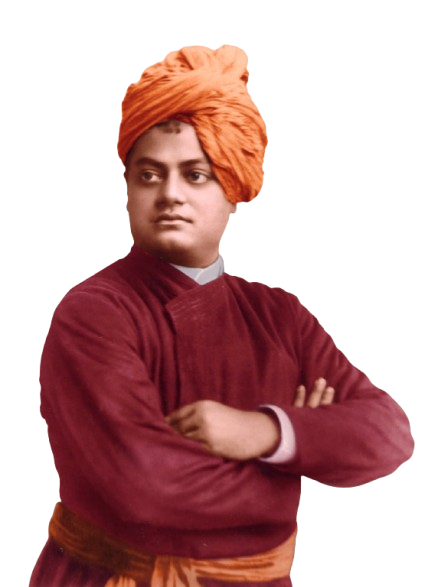Swami Vivekananda, a name that resonates with the essence of strength, spirituality, and wisdom, was one of the most influential figures in India’s history. His life, marked by profound experiences and unmatched dedication to the welfare of humanity, continues to inspire millions even today. Born on January 12, 1863, in Kolkata, Vivekananda’s journey from a young boy named Narendra Nath Datta to one of the most revered spiritual leaders in the world is nothing short of extraordinary.
Early Life and Education: The Awakening of a Seeker
From a very early age, Vivekananda was a curious child. His interest in philosophy, religion, and spirituality became evident in his teenage years. He was a brilliant student who excelled in both academics and sports. However, what set him apart was his unquenchable thirst for knowledge. His journey into spiritual inquiry began when he met the great saint, Ramakrishna Paramahamsa, who profoundly influenced his thoughts and teachings. Ramakrishna’s philosophy, which emphasized the unity of all religions, was to become the foundation of Vivekananda’s later work.
Vivekananda was a voracious reader, and he delved deep into various subjects, from Western philosophy to Indian scriptures like the Bhagavad Gita and the Upanishads. He was particularly drawn to the idea of self-realization and the divine potential within every individual. This intellectual curiosity, combined with his spiritual experiences, would later shape his life’s mission of awakening the dormant spiritual energy of India and the world.
he Iconic Chicago Speech: A Global Awakening of Swami Vivekananda
Swami Vivekananda’s most defining moment came in 1893 at the Parliament of World Religions in Chicago. As the representative of Hinduism, he delivered a powerful speech that introduced India’s spiritual legacy to the world. His famous opening words, “Sisters and Brothers of America,” left a lasting impression on the audience, earning him a standing ovation. Vivekananda’s message was clear and direct: true religion transcends boundaries and divisions, and the essence of all religions is the same—unity, love, and compassion.
In his speech, he advocated for the importance of spiritual development over materialism, emphasizing the power of the individual to rise above challenges and contribute to society. His words echoed across continents, and Swami Vivekananda became a global ambassador for India’s rich spiritual heritage.
The Vision of a Strong and United India
While Vivekananda was deeply spiritual, he also recognized the importance of social reforms. His vision of India was not just of a spiritually awakened nation, but of a society where people, irrespective of their caste, creed, or gender, could live in harmony and dignity. He stressed the need for education, particularly for women, and the empowerment of the poor and marginalized. His message was clear: only through education and self-awareness could India achieve true freedom—freedom not just from foreign rule, but from the shackles of ignorance and superstition.
Vivekananda’s focus on the power of youth was another key aspect of his teachings. He believed that the youth held the key to India’s future and that their energy, if channeled correctly, could bring about monumental changes in society. He inspired countless young Indians to seek knowledge, engage in selfless service, and strive for greatness. His famous quote, “Arise, awake, and stop not until the goal is reached,” continues to motivate millions to this day.
A Life Dedicated to Service
Swami Vivekananda’s life was marked by an unwavering commitment to serving humanity. He founded the Ramakrishna Mission in 1897, which focused on providing education, healthcare, and social welfare to those in need. His deep empathy for the poor and downtrodden led him to dedicate much of his time and energy to the service of the underprivileged. Vivekananda’s belief in “Seva” (service) was rooted in his conviction that serving others was the highest form of worship.
He also emphasized the importance of a strong mind and body, advocating for physical fitness alongside spiritual development. His approach was holistic, aiming to create a balance between mental, physical, and spiritual well-being.

The Lasting Legacy of Swami Vivekananda
Swami Vivekananda’s impact on Indian society and the world cannot be overstated. His ideas helped shape the modern Indian identity, one that combined spiritual depth with a commitment to progress. His teachings continue to resonate with people from all walks of life, transcending geographical and cultural boundaries.
He passed away on July 4, 1902, at the age of 39, but his influence has remained timeless. Institutions like the Ramakrishna Mission and the Vivekananda Educational Society carry forward his vision, helping millions live better lives through education, service, and self-awareness.
Swami Vivekananda’s life was an embodiment of the power of self-realization, service, and unity. He taught us that each individual has the potential to achieve greatness, and it is through faith in oneself and in the higher purpose of life that we can truly make a difference in the world. His teachings continue to inspire not only the youth of India but also people across the globe who seek wisdom, inner peace, and a path to contribute meaningfully to society.
Conclusion
Swami Vivekananda’s life and teachings offer a roadmap for living a life of purpose, inner strength, and compassion. In a world that often feels divided and lost, his message of unity, empowerment, and spiritual awakening remains a beacon of light for all. As we reflect on his life, we are reminded that greatness is not just about personal success, but about uplifting humanity, serving others, and staying true to one’s inner calling. Vivekananda’s legacy is indeed a timeless treasure for all generations to come.
